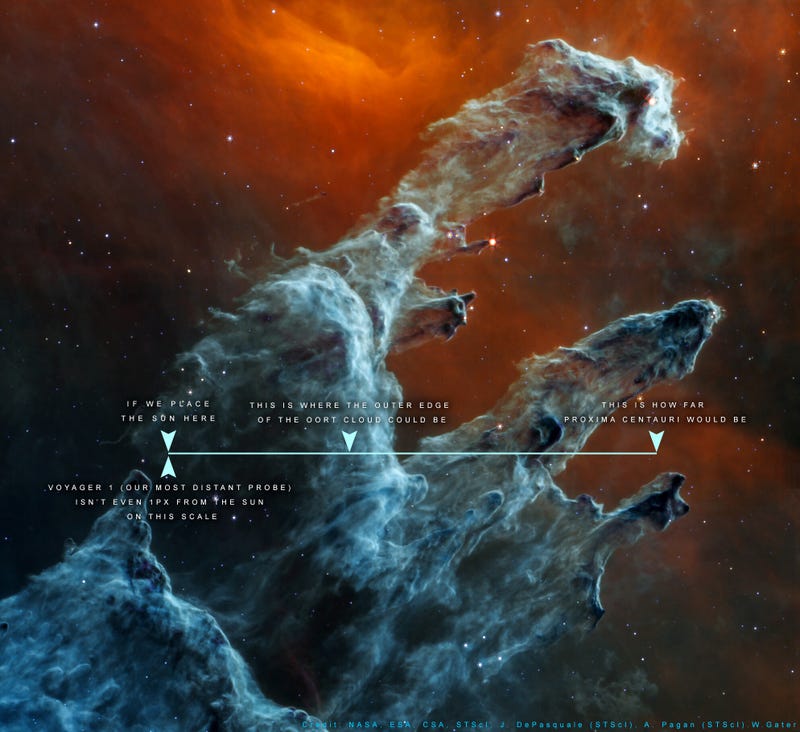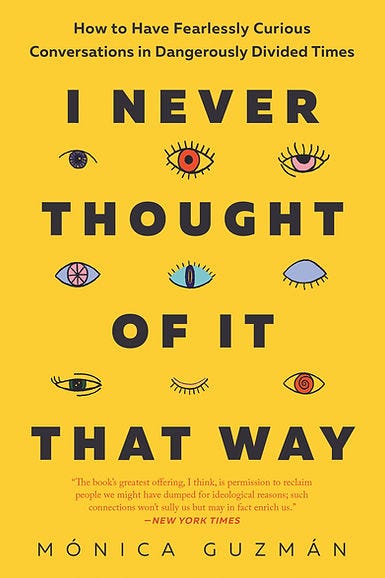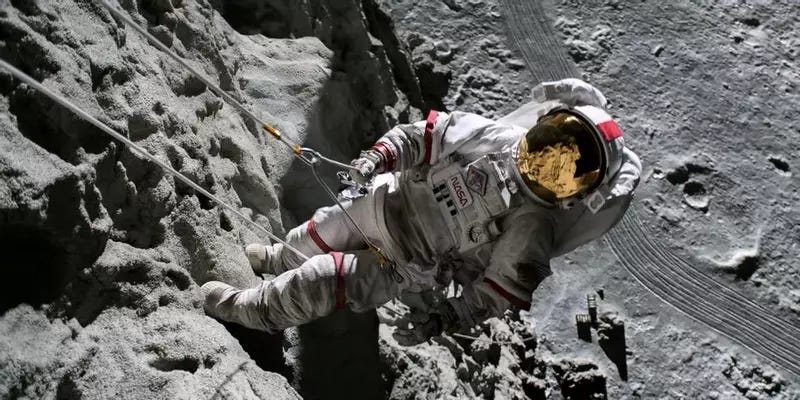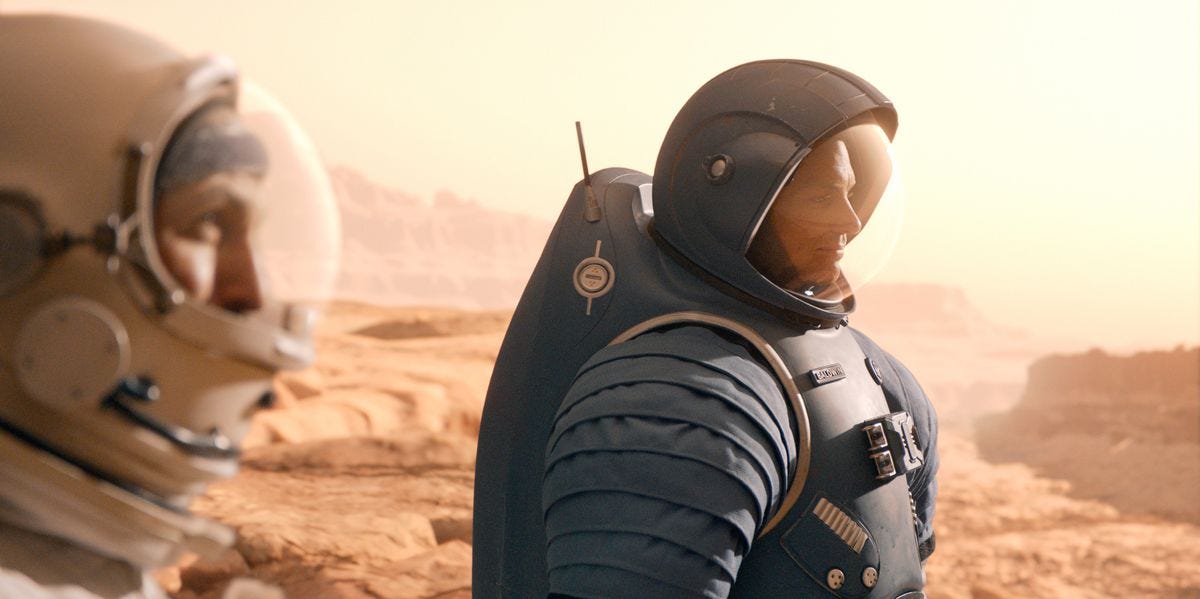Three Ways That Kindness Fixes Everything
Let's mix some hard science with some grounded optimism.
Hello! This is Everything Is Amazing, a newsletter about curiosity, science and imaginary towns that refuse to stay fake.
If you missed it this week, courtesy of new images from the JWST, behold the Pillars Of Creation at a scale that will melt your mind:
To explain a little: as of 2013, the Voyager 1 probe has now left our solar system and entered interstellar space - and yet the colossal distance it’s travelled doesn’t even register as the width of a pixel on this image.
(The source is this tweet by astronomer Will Gater - I would have embedded it within the original tweet, but you can’t read the text if I did that. I hope Will would forgive me!)
And today, a continuation of our investigations into the power of empathic curiosity, by trying to use science to answer the timely question, “What’s the point in learning to be kinder when Those People Over There are such total, unmitigated f@!#$*&s?”
Let’s dive in!
1. Kindness Is Radical Self(ish)-Care
Do you know someone elderly who is remarkably spry for their age? That could be because they’re unusually kind.
I know, that sounds like the kind of oh purleez news headline that makes you want to throw your phone in the sea. And hey - what about those incredibly healthy-looking narcissistic sociopathic tech billionaires? But no, I promise this is all about real science, and it also logically supports the argument that super-selfish, super-awful people are doomed to have relatively crappy lives! That’s two excellent reasons to keep reading!
Firstly, you may have heard the often-cited fact that people who volunteer for things generally live longer - a comparable boost to eating a diet with the right amount of vegetables and fruit every day. This is in fact true! But wait - since correlation doesn’t mean causation, it could just be that healthier people tend to volunteer more?
Here’s something that scientists probably wish we bore in mind more often: things like this occur to them as well…
“Even when scientists remove the effects of pre-existing health, the impacts of volunteering on wellbeing still remain strong. What’s more, several randomised lab experiments shed light on the biological mechanisms through which helping others can boost our health.
In one such experiment, high school students in Canada were either assigned to tutor elementary school children for two months, or put on a waitlist. Four months later, after the tutoring was well over, the differences between the two groups of teenagers were clearly visible in their blood. Compared to those on the waitlist, high-schoolers who were actively tutoring the younger children had lower levels of cholesterol, as well as lower inflammatory markers such as interleukin 6 in their blood – which apart of being a powerful predictor of cardiovascular health, also plays an important role in viral infections.”
- “Why being kind to others is good for your health,” Marta Zaraska, BBC Future
It also turns out that perpetuating a random act of kindness on a stranger lowers the activity of certain leukocyte genes. Leukocytes are the white blood cells released by our immune system to fight infections - and an unfocused overabundance of them is associated with lingering or even chronic inflammation.
Compassion also releases oxytocin, which helps lower blood pressure and is therefore regarded as an important protector of the heart.
Then there’s how it makes you feel to be kind: that odd warm glow in your stomach that gives you a mild high for hours afterwards. This is enough of a universally experienced reaction to be the subject of a number of studies, none of them yet conclusive - but one at the University of Sussex found that the brain scans of over a thousand people seemed to show differences between otherwise identical acts of strategic kindness (“I’m doing this for you in the hope you’ll give me something in return”) and altruistic kindness (“I’m expecting nothing but the satisfaction of doing the right thing”). In the latter case, different parts of the brain showed activity - a possible sign of the “warm glow” in effect?
(It’s interesting how this tallies with Adam Grant’s model of ‘Givers’ and ‘Matchers’, which I previously wrote about in this newsletter.)
While it seems there is a hereditary basis for heightened empathy, it can also be learned, through the application of compassionate acts - or, in other words, by regularly being kind to other people.
There is of course a delicious irony here. All those grasping, selfish egotists in the world who only care about enriching themselves at the expense of others in every possible way? If they really cared about their long-term health, they’d start being fanatically kind to everyone around them! But this, of course, is the last thing they’d ever think of doing!! Ah. I know it’s unkind to laugh, but….oh dear. Bless ‘em.
2. Kindness Is Listening Harder
In her terrific TEDx talk from earlier this year, journalist Mónica Guzmán outlines how empathic curiosity can be used to create understanding across seemingly unbridgeable divides.
In politics right now on both sides of the Atlantic (and elsewhere!), it seems to me that most talk of treating the opposing side with curiosity is quick to devolve into “yeah, but LOOK AT WHAT THEY VOTED FOR!!!” - followed by a finger pointed at one of the noisiest and most objectionable members of said group, with the assumption that their extremism typifies everyone who voted the same way.
Sometimes this is warranted. Awful people are undeniably awful and, in the right circumstances, well worth calling out in the interests of factchecking, debate and questioning whatever damn-fool thing they just said.
But much more of the time, this can’t be true. It just can’t. No political party in history - apart from maybe a very, very small one - has featured members who are all perfectly united in their beliefs and motivations. This is the whole point of a democracy! Everyone needs a say because everyone’s say is a little different.
How does the internet facilitate this? In places, profoundly not well! Our abbreviated tools of communication aren’t up to the job. Many of them run (intentionally or not) on superficiality, negativity and conflict. No wonder we’re all yelling!
It’s easy to say all this in the abstract. But Guzmán went and put it to the test. In researching her book “I Never Thought Of It That Way,” she put herself in the middle of those hard, necessary, boots-on-the-ground conversations, and engineered opportunities for US voters on both sides of the partisan divide to meet and share their concerns. She gets talking to a Democrat voter called Laura:
“Curiosity’s pull is strong. Can you resist it? Laura couldn't. And that's how she found herself signing up for a trip I helped organise: a trip from Seattle to a place called Sherman County, Oregon. A place where just 1,700 people live, on land that's 10 times the size of Seattle, where “BLM” doesn't typically mean “Black Lives Matter,” but “Bureau of Land Management.”
This is a place that's the political mirror opposite of King County [Laura’s home] where Seattle sits. 74% of voters in King County went for Clinton in 2016 - while 74% of voters in Sherman county went for Trump.
We organised this trip in partnership with locals in Sherman County to let urban liberals and rural conservatives get curious about each other with each other. How does getting curious across these big divides start?
It starts by turning an assumption into a question.
On the bus ride down, Laura asked herself, “if people are voting opposite me, are they feeling opposite me on these issues that matter to me? Or is there something I'm missing?”
During the event, a Sherman county farmer named Darren stood up near Laura - all six foot nine of him - and pointed to the plates of leftover sandwich we'd had for lunch. Darren grossed 7000 acres of wheat with his Dad and son. He looked at the people from the big city. “If you knew,” he said, “what it took to get that sandwich on your plate...”
Turns out, Laura and Darren had some things in common. Darren has no issue with same sex marriage or other civil rights. He wants a healthy environment. His crops depend on it. So why did Darren vote for Trump?
The Waters of the United States Rule figured into it, he told us - it was threatening his business. Now, when he said this, the locals from Sherman County all kind of nodded their heads. But Laura and everyone from Seattle, we just looked at each other: the Waters of the United States? What the heck is that? Turns out, the Rule defines what bodies of water fall under federal regulation - and farmers are worried that it could be interpreted to cover small seasonal rain-made ponds on their land.
Losing control of their land is a nightmare for any farmer. Many of them don't trust Democrats to take their concerns seriously. But they might trust Republicans - and the businessman America had just elected president.
Laura did not see this coming. She told me, “it never entered my consciousness that they voted that way for reasons I hadn't even considered, or for reasons that didn't matter to me.”
She had found some things she was missing. And that experience she told me has helped her turn her assumptions about other people into questions ever since.
“Our lives are so different,” he said. “We're not even playing the same game at the end of the day.”
But we assume we are playing the same game pretty often. Same rules, same objectives. We assume people oppose what we support because they hate what we love. That doesn't just keep us from seeing what we're missing - it keeps us from staying informed about the one thing that scares us most: each other. In one CBS YouGov poll this year, most Americans said that the biggest threat to the American way of life is “other Americans.”
Now it's true, there are people at our political extremes who are so consumed by hate that they are worth fearing. But researchers at the University of Pennsylvania looked into the hostility inside sends the other and they found something fascinating. They found that people on either side of America's political divide, assume the other side despises them twice as much as they actually do.
This fear? It's a problem. Because you can't wonder about something you think is out to get you.”
As Guzmán says later in her talk, what everyone wants in a functioning society is to be heard and to be understood. And it’s more fundamental that that - it’s a basic human need. See me for who I am.
Talking about kindness, we usually think of tangible gifts, the kind we get at Christmas or on our birthdays. Or we just boil it back to money. But taking the time to listen and understand are a great kindness too - sometimes a priceless one. They give another person the dignity of being heard, to have a voice that says exactly what they’re saying, instead of what we assume they’re saying.
All of this is fantastically hard to put into practice. Election cycles remain dominated by news media soundbites, social media yelling-matches and everything else that hasn’t worked so well in actually creating conversation. Oh and hey, an extremely opinionated billionaire just took over Twitter. The yelling will continue.
But as Guzmán says: “whoever is under-represented in your life will be over-represented in your imagination.”
The ability to step back from an assumption about others, turn it into a question, and get curious about what you don’t know about why a stranger is voting the way they are when it’s so obviously the wrong thing to do on every level and what are they thinking and they must be monsters - that pause is worth exploring, for all our sake. To lessen our grip on our opinions, and consider what we don’t yet know we don’t know - and to give a stranger the kindness of the benefit of a doubt, until you find a way they can tell you directly what’s up.
3. Kindness Is The Only Future That Makes Sense
My favourite TV show right now is Apple TV’s “For All Mankind,” created by Ron Moore (“Battlestar Galactica,” “Outlander”).
It’s historical science fiction with a twist: what if the first person on the Moon in 1969 wasn’t the Americans but the Russians? What would that have done to NASA’s Space programme, with its political (or perhaps “surrogate for war”) rivalry with the USSR? And what if the Cold War lingered and extended upwards, onto the Moon and beyond it?
It’s good.
It’s really good.
It’s good enough that Gizmodo/io9 recently published an apology piece that starts with the following statement:
As the credits rolled on the third season finale of For All Mankind, I felt awful. But not because the show was awful. On the contrary. It was legitimately magnificent. I felt bad because I knew that I’d let a bunch of people down. Mainly, you, the reader, for not passionately screaming about just how excellent this show is much, much earlier.
In the three seasons so far (with a fourth already greenlit), it’s established a strong name for itself in a number of ways. Firstly: the setup. Because this is an alternate history, roughly covering a decade per season (the third season earlier this year covers the 1990s) it’s a really thrilling mixture of factually accurate nostalgia and I have no bloody idea what the hell is going to happen next. Because you really don’t.
You’ll see real figures from our history, like the immensely controversial Wernher Magnus Maximilian Freiherr von Braun, former rocket engineer for the German Nazi Party and Allgemeine SS, recruited after the war to be a director for NASA. (He’s absolutely real, and this really happened.)
But something subtly unfamiliar is always unfolding. By the early ‘90s in this timeline, astronauts are exploring Mars on foot - having previously faced off with each other on the Moon, carrying guns. Space tourism is well underway. The Soviet Union hasn’t collapsed. North Korea has a successful space programme. And so on.
At its heart, though, it’s a character drama, underpinned by some terrific performances with a lot of nuance. Ron Moore (with his co-creators Matt Wolpert and Ben Nedivi) have created a really fantastic ensemble of characters - and you can see, as with his previous shows, Moore’s gleeful willingness to absolutely put them through hell, in order to see what they’re made of.
(More on character in a minute. It’s the whole point I’m going to make.)
Secondly, it’s filled with moments of heart-stopping, stomach-churning tension, all delivered with what looks to my relatively uninformed eye as the best depiction of real-world space physics that’s been dramatized on the small screen. (Really, “small screen” is a bit misleading here: the visual effects are really incredible.)
The apparent profound blackness of space in low orbit is spot-on.
Big things move slowly but with terrifying momentum.
People die, because space is dangerous and utterly, utterly unforgiving of their mistakes. (And this is a world with NASA under immense political pressure to take more risks. Any mistakes can easily becomes a disaster.)
As an example, here’s an excerpt from season 3. Please note: there’s no gore here, but this is one of those OMG OMG NO I CAN’T LOOK moments and it becomes nightmarishly intense:
I don’t really want to tell you anything more about it, in fear of spoiling anything. It is just such a wild ride - in the way of the best premium dramas, by giving the story time to breathe, the characters time to show how they are and to be changed as the years play out, and for everything to sink in until you’re absolutely buying it.
As a multi-decade character drama, it’s also playing a difficult hand. Its core cast remain largely in place, meaning they’re getting older by a decade every season, yet remaining central to the most important events of the story. This has…stretched my credulity a few times, particularly in season 3, but never in a way that hasn’t been wholly redeemed by where the story takes them.
To date, it’s a show that rewards your faith in it: if you don’t know where all this is going, that’s the whole point. It’s a feature, not a flaw.
(Wait until you see where it goes! It’s bonkers, mate.)
But above all, it’s made a name for itself with its optimism. This is a science-based story that convinces because it shows what happens when people find a way through some recognisably chaotic times by finding ways to work together. By showing each other kindness, and forging a spirit of cooperation from it.
If For All Mankind has a message, it’s we get there together or not at all. There are no perfect heroes, and no outright villains. People make mistakes for all the richly human reasons a character drama is fuelled with. And when that happens (which it does, to everyone), they’re not alone when they pick up the pieces of the mess they made.
And the end result (spoilers!) is that everything keeps moving forward: imperfectly, contentiously, but unmistakably forwards.
If you’ve read scifi since the “Golden Era” of Asimov, Heinlein and the like, you’ll recognise this shift. It’s happened in books, and I’m so glad it’s happening in films and on TV too. A shift towards showing the future as a collaborative effort, not the realm of Great People (usually Great Men) doing Great Things and singlehandedly turning the course of humanity in a more enlightened direction, perhaps by heroically outwitting or outfighting The Enemy with nothing but a blaster, a fast spaceship and all the cunning of a protagonist in their prime.
(Seriously, bollocks to all that. It’s not what happens in the real world, it’s not what happens in science, and it’s not how we got here - so I can’t see how it’ll be the best way we proceed into whatever future awaits us?)
It now seems that some scifi is moving past this fascination for individualistic messiah-complex storytelling, and towards something a bit more reflective of how things really get done in the real world. I hope a lot more follows on its heels. (Here are two other examples of good ensemble scifi storytelling that I previously mentioned.)
The key to For All Mankind’s story is that sooner or later, all the characters learn to listen to one another, in just the way Mónica Guzmán describes above. They have lots of really hard conversations about really hard things. Some are excruciating to watch. Sometimes they don’t help at all, and things get even messier. Sometimes things fall apart completely.
But at some point, enough empathetic curiosity (manifesting as mutual kindness) is shown that everyone stops fighting and starts building.
That’s a future I can believe in, mess and all.
Bring it on.
Images: PublicDomainPictures; Apple TV;







It's great to get some scientific support for being a kind person. That's a really uplifting message.
Love this - kindness works on both sides of the equation 🤍